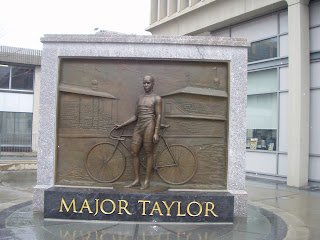Historical Profile: Marshall Walter "Major" Taylor

The Marshall "Major" Taylor monument at Worcester Public Library Worcester, MA. - L ong before Jackie Robinson broke the color line in baseball, another great African American athlete broke down barriers in another sport. Marshall Walter “Major” Taylor was the best bicyclist in the world in the late 1890s. Marshall Taylor was born on November 26, 1878 in rural Indiana. When Taylor was a teenager he went to work at an Indianapolis bicycle shop. Taylor would perform stunts on bicycles while wearing a military uniform, hence the nickname “Major.” Taylor won his first bike race in 1892. In the fall of 1895, Louis “Birdie” Munger –the bicycle shop owner moved his business to Worcester, Massachusetts. By 1898, Taylor held seven world records. On August 10, 1899, Taylor won the world 1-mile championship in Montreal. With this victory, Taylor became the second African American world champion athlete. The first was boxer George Dixon. The August 11, 1899 edition of T


